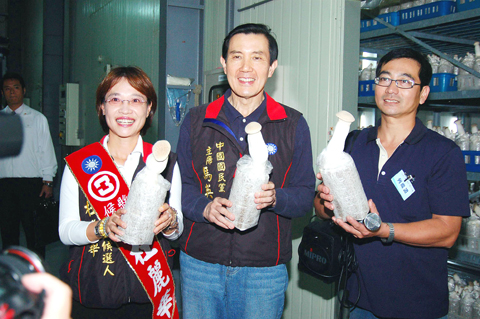Chinese Nationalist Party (KMT) Chairman Ma Ying-jeou’s (馬英九) absence from the KMT’s latest campaign commercial for the mayor and county commissioner elections next month reflects Ma’s plummeting popularity with party candidates and the central government’s poor performance, analysts said.
The KMT unveiled its first campaign commercial on Friday to promote its candidates. However, Ma, who in the past had appeared in almost all KMT campaign commercials, was not featured.
KMT spokesman Lee Chien-jung (李建榮) dismissed concerns about Ma’s absence, adding that the party’s 18 candidates were the protagonists in the upcoming elections.

PHOTO: HUA MENG-CHING, TAIPEI TIMES
Premier Wu Den-yih (吳敦義) joined Lee in brushing off speculation that Ma’s low support rate as president made the party hesitate to use him in the ads, adding that the election of local government heads should not reflect the public’s view of Ma’s national policies.
Political commentators, however, said Ma’s absence from the commercial highlighted the KMT’s attempts to separate Ma from party candidates and to prevent the government’s performance from affecting the elections.
“The upcoming elections are the first major elections Ma will be facing as president and KMT chairman, and of course this is an important test for him,” said Wang Yeh-lih (王業立), a political science professor at National Taiwan University.
The KMT’s decision not to include Ma in the first campaign commercial for the Dec. 5 elections indicated a decline in Ma’s popularity amid the government’s poor handling of a number of items, including Typhoon Morakot and the relaxation of restrictions on imports of US beef, he said.
Ma’s popularity dropped to a record-low of 16 percent in August after the government was severely criticized for its slow response in the aftermath of Morakot.
A survey released on Friday by the Global Views monthly magazine showed that a majority of Taiwanese have more trust in US President Barack Obama than in Ma, with only 38.6 percent of respondents giving their trust to Ma, while Obama enjoyed a 46.1 percent trust rate.
Ma’s plummeting support rate as president has also cost him popularity within the party, as many local candidates took down posters or billboards featuring them with Ma.
Wang Kun-yi (王崑義), a professor at National Taiwan Ocean University, said former health minister Yeh Ching-chuan’s (葉金川) defeat in the party’s Hualien County commissioner primary in October and the KMT’s crushing defeat in the Yunlin legislative by-election were both warnings to the KMT that it should not count on Ma alone in the election campaigns, although he had led the party to win elections in the past.
He said it was no surprise that the KMT tried to downplay Ma’s role in the elections this time around, but separating Ma from local candidates would have limited effect because many voters viewed the elections as a chance to cast a vote of confidence on Ma and his Cabinet.
Dismissing Wu’s comments that local factions had a great impact on local elections and that they were not a midterm exam for Ma and his Cabinet, Yang Tai-shun (楊泰順), a political science professor at Chinese Culture University, said Ma was behind the party’s nomination of candidates in several cities and counties including Hualien, Hsinchu and Taitung, and his leadership in the party will be challenged if the KMT lost in those places.

RESOLUTIONS DEBATE: Taiwan’s allies said that UN and WHA resolutions cited by China and other nations ‘do not determine Taiwan’s participation in WHO activities’ A proposal to invite Taiwan to this year’s World Health Assembly (WHA) was rejected on Monday, resulting in Taipei’s absence from the annual meeting for a ninth consecutive year, although partners spoke up for Taiwan’s participation at the first day of the meeting. The first agenda item after the opening was a “two-on-two debate” on a proposal to invite Taiwan to participate at the WHA as an observer. Similar to previous years, two countries made statements in favor of the proposal, while two others expressed their opposition. Philippine Secretary of Health Teodoro Herbosa, president of the 78th WHA, accepted the WHA General Committee’s

Palauan President Surangel Whipps Jr arrived in Taiwan last night to kick off his first visit to the country since beginning his second term earlier this year. After arriving at Taoyuan International Airport at around 6:30 pm, Whipps and his delegation were welcomed by Minister of Foreign Affairs Lin Chia-lung (林佳龍). Speaking to gathered media, the Palauan leader said he was excited and honored to be back in Taiwan on his first state visit to Taiwan since he was sworn in this January. Among those traveling with Whipps is Minister of State Gustav N. Aitaro, Public Infrastructure

Premier Cho Jung-tai (卓榮泰) on Friday laid out the Cabinet’s updated policy agenda and recapped the government’s achievements ahead of the one-year anniversary of President William Lai’s (賴清德) inauguration. Cho said the government had made progress across a range of areas, including rebuilding Hualien, cracking down on fraud, improving pedestrian safety and promoting economic growth. “I hope the public will not have the impression that the Cabinet only asked the legislature to reconsider a bunch of legal amendments,” Cho said, calling the moves “necessary” to protect constitutional governance and the public’s interest. The Cabinet would work toward achieving its “1+7” plan, he said. The

Nvidia founder and CEO Jensen Huang (黃仁勳) hosted a dinner in Taipei last night with key Taiwanese suppliers to celebrate the successful mass production of the company’s new Blackwell AI systems. Speaking to the media earlier yesterday, Huang thanked Nvidia’s Taiwanese partners for their contributions to the company’s ecosystem, while also sharing his plans to meet with Taiwan Semiconductor Manufacturing Co (TSMC) founder Morris Chang (張忠謀). In response to rumors that Nvidia will launch a downgraded Hopper H20 chip for China in July, Huang dismissed the reports, saying, “That is not true.” He clarified that there